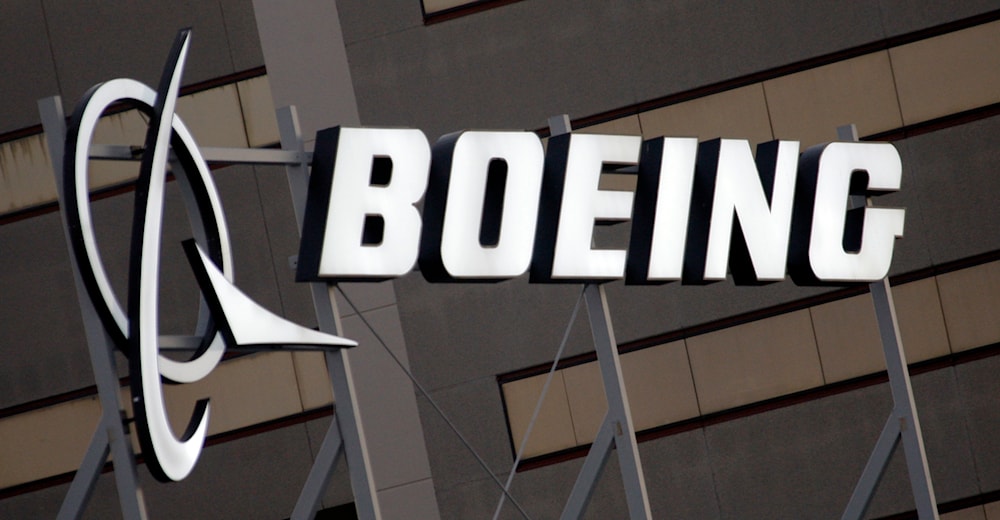FAA investigates new whistleblower claims on Boeing's 787, 777
The new claims entail that the 787 Dreamliner has assembly defects that threaten safety.
-

The Boeing logo is seen, on Jan. 25, 2011, on the property in El Segundo, Calif. (AP)
New claims by a Boeing engineer, who has worked for the company for more than 10 years, said that the 787 Dreamliner has assembly defects that threaten safety and are being investigated by federal aviation authorities, US officials said on April 9.
Attorneys for the whistleblower, Sam Salehpour, who revealed that the company retaliated against Salehpour for raising these concerns by "involuntarily" moving him to the 777 program, also accused the company of valuing profit over safety.
He was later threatened with termination after he raised further issues at the 777 program, his attorneys said.
A deeper dive
Attorneys Debra Katz and Lisa Banks said, "Rather than heeding his warnings, Boeing prioritized getting the planes to market as quickly as possible, despite the known, well-substantiated issues Mr. Salehpour raised," having mentioned "critical defects" on nearly 1,500 Boeing planes.
Salehpour said that Boeing uses shortcuts during its assembly processes, which causes excessively large gaps between different plane parts that could "ultimately cause a premature fatigue failure without any warning, thus creating unsafe conditions for the aircraft with potentially catastrophic accidents," as revealed by an FAA complaint published by his attorneys.
"Our client's concerns about the 'schedule over safety' culture at Boeing has been made all the more urgent as a result of the recent incidents involving defects in Boeing's 737 MAX 9 airplanes," the complaint added.
Mark your calendars
After The New York Times highlighted these claims in an article and the charges against Salehpour, the Federal Aviation Administration(FAA) confirmed the investigation.
"Voluntary reporting without fear of reprisal is a critical component in aviation safety," the FAA said.
A spokesperson for Democratic Senator Richard Blumenthal revealed that a Senate investigative committee has scheduled a hearing for April 17 titled "Examining Boeing's Broken Safety Culture: Firsthand Accounts."
Of course, they denied
Boeing, on the other hand, published a detailed defense of the aircraft, saying it is "fully confident" in the Dreamliner and denied the charges it retaliated against Salehpour.
In its statement, Boeing said the issues raised by Salehpour "have been subject to rigorous engineering examination under FAA oversight," claiming that retaliation is "strictly prohibited" at the company while further describing Salehpour's claims on the 777 as "inaccurate".
After slowing output and stopping deliveries for almost two years due to employees identifying conformance issues on the 787, according to Boeing, it incorporated "join verification" into production processes.
"For the in-service fleet, comprehensive Boeing and FAA analysis determined there is no near-term safety of flight concern," the company said, adding that "based on the analysis and any future inspection, the 787 will maintain its strength, durability, and service life."
Friends suspect Boeing whistleblower's death a murder, not suicide
The New York Post on March 15 reported that Boeing whistleblower John Barnett who is alleged to have died by suicide on March 9 has told friends that he could possibly end up being killed after raising safety concerns about the company.
"If anything happens, it’s not suicide," he was quoted as saying by one of his close friends.
Barnett was found dead in a pickup truck in South Carolina on the exact same day he was due to conclude a closed-door testimony in a lawsuit against Boeing. The Charleston County coroner's office in South Carolina initially ruled that the 62-year-old died from a self-inflicted gunshot wound. However, Barnett's friends, family, and lawyers believe otherwise.
"I know that he did not commit suicide. There’s no way," a family friend, only identified as Jennifer, told ABC 4.
The friend asserted that Barnett had expressed to her his fear of potentially meeting a fatal outcome after he began publicly addressing his safety concerns related to Boeing following his retirement in 2017. "He wasn’t concerned about [his own] safety because I asked him," Jennifer told the outlet. "I said, 'Aren’t you scared?' And he said, 'No, I ain’t scared, but if anything happens to me, it’s not suicide.'"
Jennifer mentioned that they discussed Barnett's upcoming deposition in the Boeing legal case during the same conversation. She suspects that someone disagreed with his views and possibly sought to silence him.
Barnett, who worked as a quality manager at Boeing, had "exposed very serious safety problems with the Boeing 787 Dreamliner and was retaliated against and subjected to a hostile work environment," they added.
He had spoken to media outlets about the incident on January 5 involving a Boeing 737 MAX 9 plane. During the flight, a panel blew out mid-air, leading to passengers being exposed to the outside air, necessitating an emergency landing.

 5 Min Read
5 Min Read








